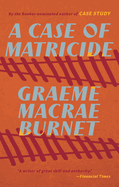
Following The Disappearance of Adèle Bedeau and The Accident on the A35, Scottish novelist Graeme Macrae Burnet (Case Study) returns with the distinguished final book in the Inspector Gorski trilogy, which is centered on a Frenchman with the job of Simenon's Maigret and the dimensionality of a Proust character.
One morning Chief Inspector Georges Gorski of the Saint-Louis Police is summoned by a hotelier who thinks there's something "fishy" about his only guest. That afternoon, Gorski visits the home of an elderly woman who's convinced that her son intends to murder her. Then there's the death of a wealthy industrialist, who appears to have had a heart attack but who, Gorski observes at the scene, has fallen backward in an "unnatural posture," as if he was pushed. Readers will conclude that these three bits of suspicious business are the building blocks of a crime novel; readers will be right and wrong.
Set in the early 1980s, A Case of Matricide features a satisfyingly fiendish incidence of comeuppance, but the punctilious Gorski's detective work plays a subordinate role in the narrative: he's consumed by, among other things, his floundering marriage and a childhood misdeed. The series' conceit is that it's "translated and introduced by" Burnet but authored by Raymond Brunet, a Saint-Louis writer who killed himself in 1992. Readers will likely be split on whether this meta framework is gratuitous or earned, but all should agree that the book is a filigreed character study with the feel of a slow-boil noir. --Nell Beram, author and freelance writer

